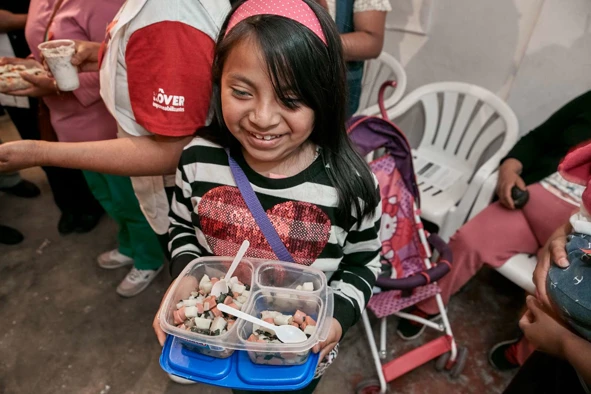Diabetes prevention in schools, Mexico

Objectives
Diabetes is the leading cause of death in Mexico, with a mortality rate of 12 % (WHO 2002). Diabetes in adolescents, especially type 2, used to be regarded as an uncommon and rare condition in Mexico. This view has changed during the last decades as Mexico like other developing countries faces a huge challenge of childhood obesity.
Worldwide, increasingly more children and adolescents are becoming overweight and obese and consequently, they are at a high risk of future diabetes. Unhealthy diet and lack of physical activity are the biggest risk factors. As lifestyle patterns get established in childhood, inculcation of healthy behaviour through health promotion early in life is expected to yield good results to prevent obesity and future diabetes. A school based programme to teach children healthy behaviour has therefore been initiated in two communities in Mexico City.
The objective of the project is health promotion and awareness to prevent future diabetes amongst children in 40 schools in two communities of Mexico City (Tlalpan and Xochimilco) through structural changes, staff, student and parent awareness and education; and organising community coalitions.
Approach
With a focus on encouraging healthy behaviour among school children, this project is being implemented by the Inter-American Heart Foundation in cooperation with the City of Mexico. The project is an integrated part of a larger project currently in progress, focusing on decreasing major risk factors for chronic diseases in Mexico City. The present project is using the knowledge and experience gained through the Community Interventions for Health (CIH) as its starting point. A series of structural changes will be identified and implemented and consequently affect the students' health behaviour.
The project focuses on two main risk factors for chronic diseases including diabetes, namely unhealthy diet and physical inactivity. Reducing the incidence of overweight and obesity is regarded as an important step in combating chronic diseases The project is initiating various activities to achieve this goal, like healthier food options in school canteens; reducing the availability of sodas and sweets and disseminating health education messages in the school and surrounding areas.
Lack of physical activity is another obstacle for reducing or avoiding chronic diseases. Several initiatives will be implemented to ensure that the students are physically active, for instance incorporation of 30 minutes' physical activity in the school timetable and facilitating the students' access to community sport facilities. Furthermore, a workshop will be organised in order to encourage teachers and parents to help identify potential structural changes to reduce risk factors in the school setting. Events and materials will be developed in consultation with various experts and parents.
After the initial assessment has been conducted, several workshops will be arranged for health professionals, teachers, parents and school administrators. These workshops will focus on increasing the knowledge and awareness of the connection between obesity, sedentary lifestyle and diabetes. In addition, a joint event will be organised to promote the healthy lifestyle for students. The intervention activities are planned to be maintained by continuously organising workshops and events as well as competitions among the students to encourage healthy behaviour.
A community coalition will be created consisting of key social actors from the local area. NGOs, businesses, academics and government leaders will be invited to join the coalition. Furthermore, local vendors will be approached with the aim of improving the availability of healthy food in the area around the schools.
Finally, a cohort group consisting of 5,000 students, parents and school staff will be established and examined regularly during the project period, which will result in a survey of awareness of obesity and physical activity in the community. The results will be used to identify if any changes need to be made before implementing the action in another area of Mexico City.
Results at completion
• 30 public schools in Tlalpan and Xochimilco districts of Mexico City reached with more than 1,000 teachers sensitised about prevention of obesity and diabetes
• 50 teachers and school administrators at the targeted schools provided comprehensive training within prevention of obesity and diabetes
• 50 parents and community health workers provided training within prevention of obesity and diabetes
• A total of approximately 25,000 pupils at the targeted schools sensitised about prevention of obesity and diabetes incl tuition about healthy diet and physical exercise; Numerous activities conducted at each school.
• Pre- and post intervention survey conducted indicating some effect concerning dietary habits among the pupils
Project information
-
Project Nr.:WDF10-0510
-
Project status:Completed
-
Intervention areas:Prevention
-
Region:North America and Caribbean
-
Country:Mexico
-
Partners:Fundación Interamericana del Corazón (FIC) méxico
-
Project period:2011 2016
-
Project budget:USD 150,000.00
-
WDF contribution:USD 150,000.00